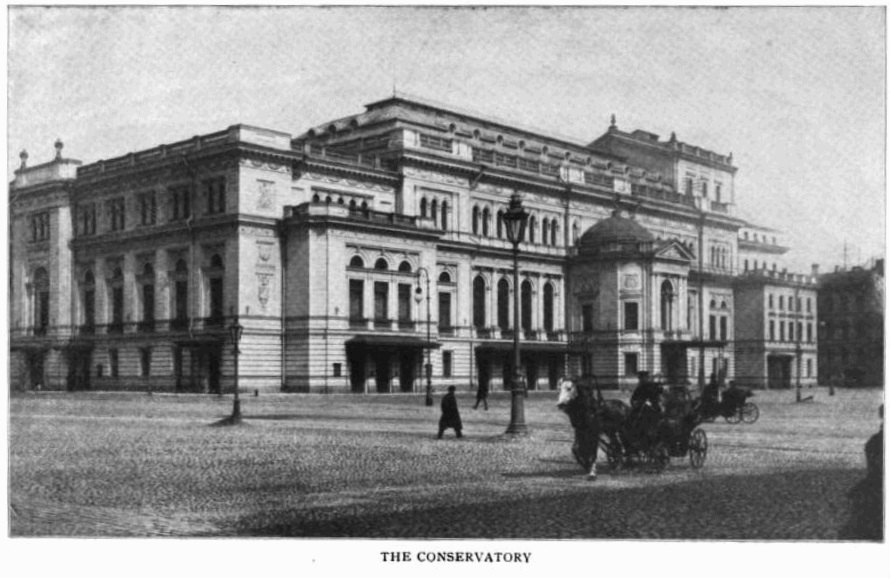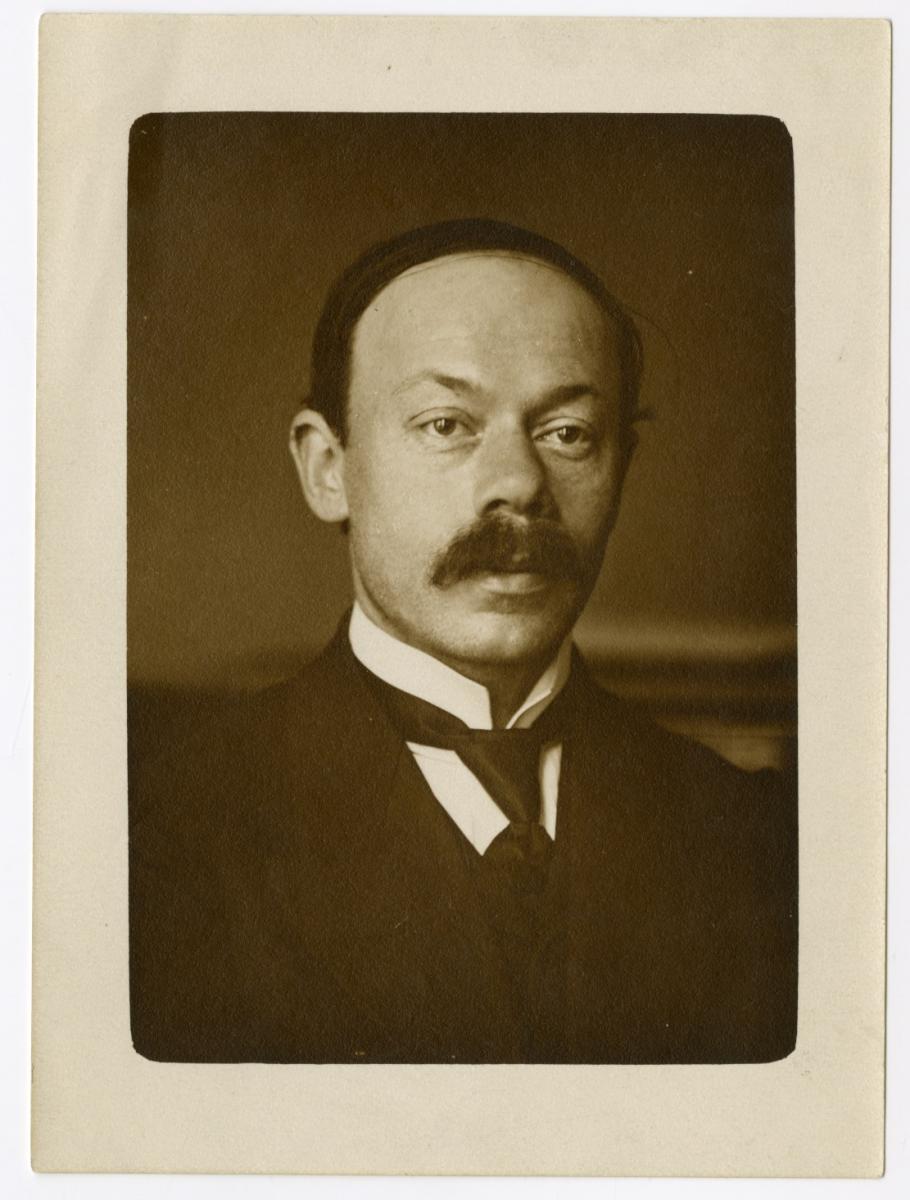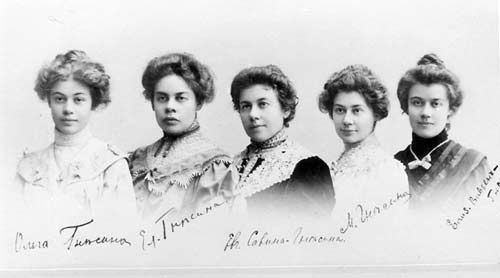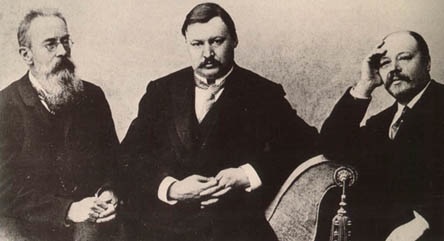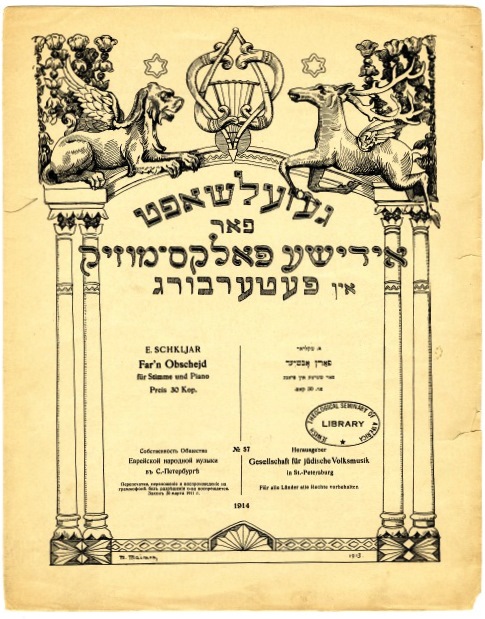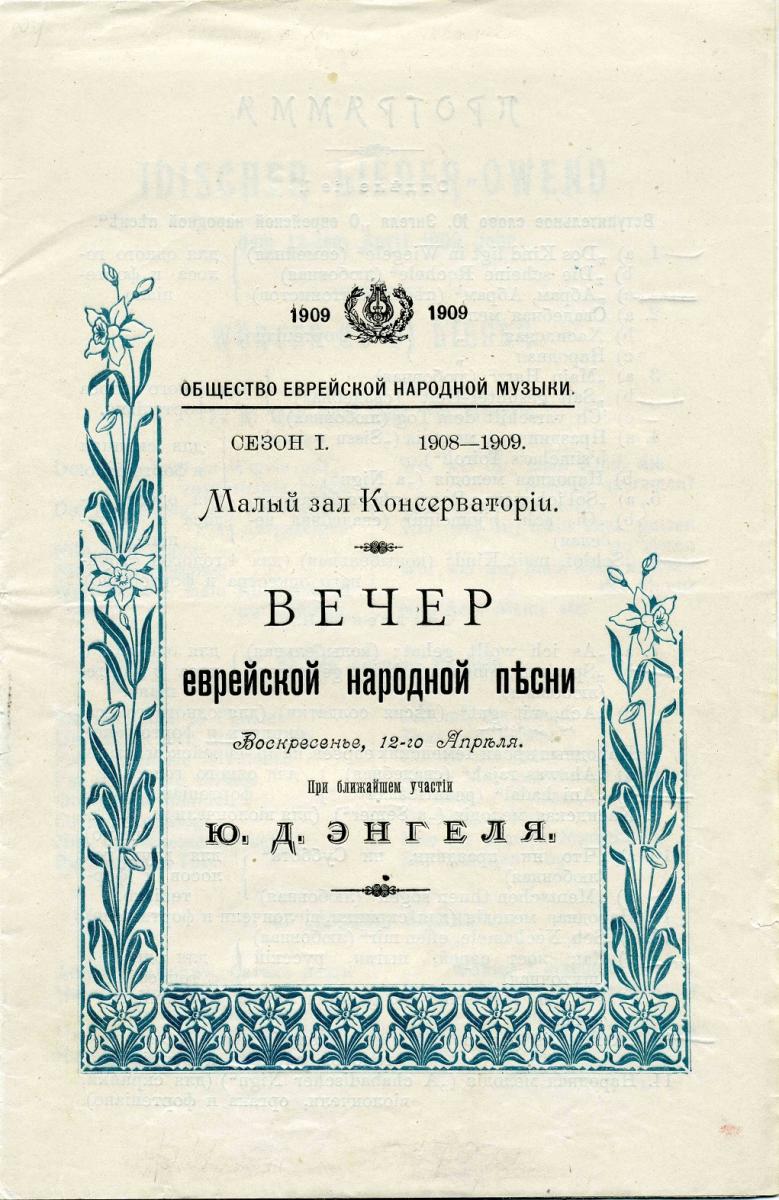In 1958, on the fiftieth anniversary of the founding of the Society for Jewish Folk Music, the composer Solomon Rosowsky published a short memoir, in which he recalled a joke from his student days a half century earlier: “Why are there so many Jewish students at the St. Petersburg Conservatory? Because it is the only school in the Russian Empire with a quota for non-Jewish students.”Rosowsky’s joke was pure hyperbole. But it stemmed from a strange fact. On the eve of World War I, over 50% of the St. Petersburg Conservatory student body, or roughly 1200 students, were Jewish. This was at a time when Jews formed roughly four percent of the total Russian imperial population and stringent admissions quotas limited the total official Jewish student percentage in other Russian university-level educational institutions to 7.3 percent (about 2500 students). The statistical disparity effectively meant that nearly one in every three Jewish university-level students in the late Russian Empire was a musician at the St. Petersburg Conservatory. While the rest of the Russian educational world strenuously denied Jews entry, Russia’s greatest musical academy welcomed them with open arms.
«A Special Kind of Antisemitism»: On Russian Nationalism and Jewish Music
תקציר באנגלית
In 1958, on the fiftieth anniversary of the founding of the Society for Jewish Folk Music, the composer Solomon Rosowsky published a short memoir, in which he recalled a joke from his student days a half century earlier:[1] “Why are there so many Jewish students at the St. Petersburg Conservatory? Because it is the only school in the Russian Empire with a quota for non-Jewish students.”[2] Rosowsky’s joke was pure hyperbole. But it stemmed from a strange fact. On the eve of World War I, over 50% of the St. Petersburg Conservatory student body, or roughly 1200 students, were Jewish. This was at a time when Jews formed roughly four percent of the total Russian imperial population and stringent admissions quotas limited the total official Jewish student percentage in other Russian university-level educational institutions to 7.3 percent (about 2500 students). The statistical disparity effectively meant that nearly one in every three Jewish university-level students in the late Russian Empire was a musician at the St. Petersburg Conservatory.[3] While the rest of the Russian educational world strenuously denied Jews entry, Russia’s greatest musical academy welcomed them with open arms.
Picture 1: The St. Petersburg Conservatory, ca. 1910 Credit: commons.wikimedia.org.
There are many concrete historical reasons for this striking trend.[4] But in this article I want to discuss not its actual causes but instead the popular perceptions of the time that encircled this curious phenomenon, elevating it from a sociological pattern to a cultural myth. For the various contemporary explanations for Jewish musical achievement that circulated in the early twentieth century actually took on a life of their own, influencing the national character of the Russian-Jewish musical movement. And the principal expression of that movement, the Society for Jewish Music, owes its origins in large part to the shared obsession of Russians and Jews with the dramatic spectacle of Jewish musicians at the St. Petersburg Conservatory.
The history of the Society for Jewish Folk Music is often told in one of two ways, either as a story of philosemitic inclusion or one of antisemitic exclusion. The philosemitic story emphasizes that Jewish music blossomed in Russia because Jews received a safe space or cultural haven at the St. Petersburg Conservatory and the benign encouragement of leading composers such as Aleksandr K. Glazunov and Nikolai A. Rimsky-Korsakov. In other words, it is about the brief triumph of liberal political values and civil society in Russia, a story of Russian benevolence and paternalism.[5] The antisemitic version stresses that Jewish music was a defiant response to Russian antisemitism. It was a proud form of Jewish cultural nationalism, a story of Jewish self-assertion.[6] But the truth is more complicated. For the story of the Society for Jewish Folk Music is really about the strange interplay between Russian antisemitism and philosemitism, which together shaped Jewish perceptions of how music could answer the question of where Jews belonged within Russian society. Taken in the broadest sense, the origins of the Society for Jewish Folk Music exposes the deeper creative tension at the root of modern Russian-Jewish culture as a whole: the conflict between Russian imperial and Jewish national identities.
The imperial dimension to Jewish national culture is easy to overlook in writing the history of Jewish national music in early twentieth-century Russia. This is because most of our accounts of this formative period were composed long afterwards by artists in exile, operating with fundamentally new conditions in terms of both Russian politics and European antisemitism. Most of all, it is due to the fact that the later success of Zionism obscured the more protean, politically embedded nature of Jewish national identity, as well as the culturalist goals animating Jewish artistic movements in late Imperial Russia.[7] We now recognize increasingly that the Austro-Hungarian and Russian empires played decisive roles in shaping the nationalist visions of Jewish intellectuals and artists in the late nineteenth and early twentieth century.[8] Many Russian Zionists saw cultural revival as an end in and of itself, one which did not require mass migration to Palestine. It should come as little surprise, then, to detect the traces of empire in the aesthetics of Jewish composers.
The clearest example of these various ideological currents at work comes in the unpublished memoirs of the composer Mikhail Gnesin.[9] With his early prominence in the leadership of the Society for Jewish Folk Music, his overt Jewish nationalist politics, and his illustrious legacy as the grandson of a famous Yiddish folksinger who roamed the streets of Vilna, not to mention his actual Jewish compositions, it makes sense to view Gnesin as the very model of the modern Russian-Jewish composer. In truth, however, he did not begin his career at the St. Petersburg Conservatory that way. Much like his illustrious sisters, Gnesin initially saw himself as a Russian artist, not a Jewish one.[10] Yet he quickly encountered a range of conflicting attitudes towards his Jewish minority status that transformed his view of what Jewishness meant in modern Russia. As his memoirs indicate, he found the seeds for a Russian-Jewish musical identity in his fraught interactions with his Russian professors.
Picture 2: Mikhail Fabianovich Gnesin (1883-1957) as a young man. Credit: Russian Institute for the History of Art.
Picture 3: The Gnesin sisters. From left: Olga, Elena, Evgeniia, Maria, and Elizaveta. Founders of the Gnesin Musical Academy in Moscow. Credit: commons.wikimedia.org.
Gnesin arrived in St. Petersburg in 1901 after having tried and failed to gain entrance to the Moscow Conservatory due to its antisemitic quotas. In St. Petersburg, by contrast, he was welcomed with open arms by the trio of legendary Russian composers: Rimsky-Korsakov, Glazunov, and Anatolii Liadov. To the young student, they represented musical gods: “Rimsky-Korsakov, Glazunov, Liadov,» he wrote, «these were the stars in the heavens above St. Petersburg around which all of us worshipfully circulated.” At the same time, these teachers were equally fascinated by their Jewish students. In fact, Liadov, Glazunov, and Rimsky-Korsakov together typified a spectrum of Russian attitudes towards Jews from antisemitism to philosemitism.[11]
Picture 4: Nikolai Rimsky-Korsakov, Alexander Glazunov, and Antaloy Liadov (from left to right). Credit: commons.wikimedia.org.
Liadov approached Gnesin shortly after his arrival in St. Petersburg. Eager to meet the new student, he repeatedly badgered Gnesin’s Conservatory instructor, the pianist Aleksandr Ziloti, with requests for an introduction.[12] Finally, the moment arrived, during a soiree at Ziloti’s house at which Gnesin was present. Liadov arrived and, ignoring the other guests, immediately to speak to him in a loud voice:
There's a lot I would like to discuss with you. First of all about the Jews—I don’t have the same relationship to the Jews as Alexander Konstantinovich Glazunov. He, after all, thinks they are the most talented nation in the world. I am not partial to them or to any other nation. But I’ve noticed something among my students. I have had a seriously large number of Jews and they’re all very . . . gifted. . . . And look, as students, they shine fantastically, they perform superbly in the course, technique comes very easily to them. And yet when they leave school they immediately harden, their brains just shut down. They cannot create anything original. But I want to say that you’re absolutely not like that. Still, even if we take [so-and-so] . . . I am convinced that he won’t develop further. In any event, in the best case his limit—hardly attainable—might be Mendelssohn.[13]
Liadov’s interpretation of his Jewish students’ common pattern of empty mechanical skill and art-less musicianship echoed the same ideas of Richard Wagner and other European musical antisemites. Jews had no national culture of their own, so this argument went, and hence they could never be creative contributors to European art, only strangers and imitators.[14] Nor was the mention of Mendelssohn a coincidence; he had been a prime target of this Wagnerian attack.[15] Gnesin was naturally profoundly disturbed by these comments. They suggested that Jewish musicians were collectively defined by an immutable national essence, which impaired their artistic potential. Yet he still cultivated a close relationship with Liadov that continued until the composer’s death years later. He recalled later how they spoke constantly of “me personally, my studies at the conservatory and compositions, my potential as a representative of Russian musical culture and as a representative of the nation to which I belong by birth.»[16]
From Liadov, Gnesin took the idea that the sole way to be a successful Russian composer was to embrace his own Jewish ethnic heritage. But this casual cultural antisemitism was not the only ingredient that shaped Gnesin’s emerging musical persona. He also experienced the curious phenomenon of Russian musical philosemitism through his relationship with the man nicknamed the “Tsar of the Jews,” Aleksandr Glazunov.[17] As director of the Conservatory, Glazunov famously went out of his way to help Jewish students. He resisted all efforts by the Ministry of Interior Affairs to impose Jewish quotas at the Conservatory, as Gnesin noted: «‘Yesterday they phoned from Stolypin,' Glazunov used to say, 'They asked how many Jews we had. I told them to answer, 'We haven't counted.'» What caused this stubborn defense of his Jewish music students? Glazunov was certainly motivated by his liberal politics and his desire to preserve the professional autonomy of his educational institution. So too did his “sense of fairness» inspire him to help deserving members of a vulnerable minority group facing terrible discrimination gain admission to the Conservatory. But as Gnesin noted, this philosemitic impulse even extended to those would-be Jewish musicians of questionable musical abilities: «This sentiment caused Glazunov occasionally even to violate the principles of art. Often, in order to help someone with an internal passport problem, he accepted a student with no musical talents.”[18]
Glazunov's deep sympathy for his Jewish students stemmed not only from his concern about their legal residency troubles. He also believed that the Jews were an intrinsically gifted musical race. In the words of violinist Mischa Elman’s father, Glazunov said that when it came to admissions, “in nine cases out of ten the fact that the student was a Jew proved his talent.”[19] Thus while Liadov viewed his Jewish students as artistically challenged, Glazunov saw them in the opposite way. He even extended this to a reversal of the Wagnerian position on Jewish creativity, as evidenced by his attitudes towards Mendelssohn. As he told Gnesin, “Look how Wagner attacks Mendelsohn, yet he himself was so indebted to him musically!”[20]
If Liadov was antisemitic in his opinions of Jewish musicians, and Glazunov philosemitic, what of Rimsky-Korsakov? The founders of the Society for Jewish Folk Music all worshipped the legendary composer and teacher as their spiritual godfather. The very founding of the Society for Jewish Folk Music hinges on the well known story about Rimsky-Korsakov’s interactions with his Jewish students.[21] One day in 1902 the composer Ephraim Shkliar presented an arrangement of a Jewish folk melody to the class. He did not call it “Jewish,” only a “Oriental melody.” But Rimsky-Korsakov noticed its “Jewish” qualities and interrupted the performance. He then exclaimed: “I am very glad to see that you are writing a composition of the Jewish variety [v evreiskom rode]. How strange that my Jewish students occupy themselves so little with their own native music. Jewish music exists; it is wonderful music, and it awaits its Glinka.”[22]
In later accounts, this incident serves as an iconic moment, proof of Rimsky-Korsakov’s philosemitism and respect for Jewish culture. As part of this canonization process, the comment has been frequently interpreted as unequivocally positive: a benevolent endorsement of Jewish national music.[23] On the surface, Rimsky-Korsakov’s remark did suggest a positive, encouraging sentiment. Yet such an interpretation ignores the obvious fact that his liberal encouragement hinged precisely on a conscious nationalist distinction whereby Jews were not considered to be true ethnic Russians. Therefore, Jews could not contribute to Russian music as authentic Russians but only as a minority people of the Russian (Rossisskii) Empire. Glinka was not their musical ancestor, Rimsky-Korsakov implied, nor did they belong by birthright to the Russian national tradition. To understand this comment, it helps to read it against a remark that Rimsky-Korsakov once made to the Russian Armenian composer Aleksandr Spendiarov: “You by birth are an Eastern person, for you the East, as they say, is in your blood, and precisely in this strength you may contribute something original in the field of music, something truly worthy.”[24] The same applied to his Jewish students. It was not an option for them to become great Russian national composers; but they could become great Jewish national composers. “Why do you imitate European and Russian composers?” he reportedly said in another account of the famous incident, again implying that a composer of Jewish origins who wrote a piece on Jewish themes would necessarily be creating Jewish, not European or Russian music.[25]
This is not to say that Rimsky-Korsakov was an antisemite. He cherished his Jewish students (and married two of his children off to Jewish musicians). Nor does it mean he thought Jews had no place in Russian culture. But his famous message was that his Jewish pupils could best please him—and best contribute to Russian music—as a national minority developing their own tradition in the Russian imperial context. By excluding Jews from Russian culture as Russians but inviting them in to participate as Jews, he therefore mixed various tropes from Russian antisemitism and philosemitism together into his otherwise inspirational message. Heaping praise on Jews for their collective musical gifts but postulating that their ethnic origins obliged them to write Jewish music, Rimsky-Korsakov assigned Russian-Jewish composers a place outside the national tradition of Russian music. Where precisely did they fit into Russian music? Rimsky-Korsakov’s comment suggested that while Jews could not become Russkii in a national sense, they could become Rossisskii in an imperial sense. In other words, they could become part of the imperial ideal of a multi-ethnic Russian (Rossiskaia) empire in which various national minorities expressed their Russianness as minorities rather than a narrower Russian national culture based on ethnic and religious Russianness.
In this sense, Rimsky-Korsakov, together with Liadov, Glazunov, Balakirev, and others, reflected what the Polish Jewish sociologist Zygmunt Bauman termed “allosemitism.”[26] That is, they treated Russian Jews – good or bad, positive or negative – as fundamentally Other, un-Russian, and different in essentialist terms. Russian-Jewish musicians could not escape this dynamic of Othering. They could not become true Russian composers, but only ethnic national minorities. At every point in the history of Jewish national music, Jewish musicians encountered a similar allosemitic attitude from their Russian mentors. This mixture of embrace and rejection was true not only for Gnesin, but for all of his compatriots in the circle of nationalist composer. Before he made it to Rimsky-Korsakov’s class at the St. Petersburg Conservatory, Ephraim Shkliar had to endure a bizarre encounter with Mili Balakirev in 1894. The notoriously rabid antisemitic composer greeted the young Orthodox Jew, apparently garbed in traditional Jewish dress with peyot (sidelocks), then a student at the Warsaw Conservatory, with great sympathy. He immediately offered to help Shkliar move to St. Petersburg to study composition there. “If your rabbi permits,” Balakirev told Shkliar, “I will set you up in my apartment and provide you with kosher food.” [27]
Picture 5: Ephraim Shkliar's Farn opsheyd, published by the Society for Jewish Folk Music, St. Petersburg, 1910. Credit: The St. Petersburg Score Collection. A Project of the American Society for Jewish Music. Click on the picture to view the score.
Similarly, upon meeting Solomon Rosowsky in 1904, a Russian lawyer and revolutionary turned would-be composer, Balakirev displayed no interest in his politics or his music. All he could focus on was his Jewish name: “Solomon! Why, it smells Biblical!” He kept repeating the name “Solomon,” Rosowsky recalled, concluding that the “warm reception” he got from the ornery antisemite had everything to do with his Hebrew first name.[28]
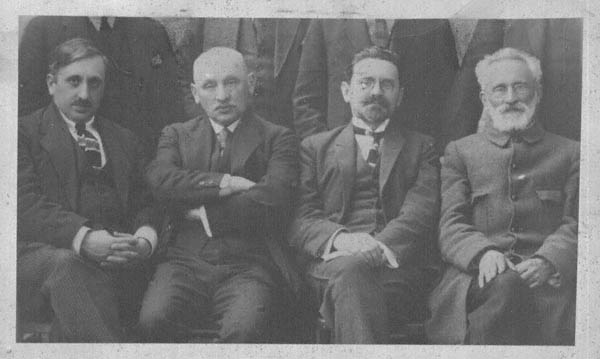
Picture 6: Solomon Rosowsky (far left), with Simon Dubnow (far right), in St. Petersburg, ca. 1908.
Credit: Jewish Theological Seminary of America.
The dilemma of the relationship between Jewishness and Russianness operated at the heart of the Society for Jewish Folk Music. In response to this Russian allosemitism, Gnesin and the other founders of the Society for Jewish Folk Music adopted Rimsky-Korsakov’s suggestion. In spite of their nationalist rhetoric, denouncing Jewish “assimilation” and calling for Jewish national independence in music, they also took pains to emphasize a distinctive Russian-Jewish identity as a Jewish nation within a Russian imperial context. That is, they did not simply emphasize Jewish national pride or promote political nationalism. Their goal was not Jewish separation from Russian culture. Their goal was fuller Jewish integration – to become part of Russian culture (and European culture, we might add) by creating a national music inside an imperial context. This mixture of integrationist and separatist impulses found expression in the work of the pianist David Shor, a leader in the Moscow branch of the Society for Jewish Folk Music, prominent Zionist, and later the first professor of music at the Hebrew University. In 1907, the same year in which Shor proudly led the finest piano trio in Moscow, he simultaneously castigated his fellow Jewish musicians for their “rootlessness.” Yet he also demanded that Jewish national music create a “universal Zionism” that would integrate itself more deeply into Russian and European society writ large.[29] Shor would later go on after 1917 to become the “unofficial intermediary” between Russian Zionists and Bolshevik leaders. For years he championed a Hebrew revival in the Soviet Union and the Zionist movement, before finally abandoning Russia for Palestine in 1925.[30]
In a late 1920s essay, Gnesin actually singled out the imperial politics of nationality in shaping the national identities of Russian-Jewish musicians: “Jewish national consciousness developed earliest in Russia not only as a reaction to the oppressed status of Jews,” he observed, “but also as a result of the fortunate role played by the Russian musical intelligentsia.” He continued:
It should be noted that there was an important link between the populist, nationalist movement among the Russian intelligentsia and their recognition of Jewishness in art. The leaders of Russian intelligentsia who were most sympathetic to populism, and who bowed down before the beauties of Russian folk art, related with sympathy and interest to the appearance of a Jewish identity in art. By contrast, those who were not Russian populists were less interested in the attempts by Jews to create their own national identity and embrace their Jewishness. This can be illustrated by reference to a few specific individuals. If we look, for instance, at the antisemitism of Balakirev, we find nonetheless that it was a special kind of antisemitism, with unique characteristics, which are worth noting. This whole group, with Stasov at the head, related with great enthusiasm to Jewishness…And so the Balakirevian antisemitism had a distinct impact. When he recognized attempts to create national art, he rallied quickly to the cause, no matter its source.[31]
It’s not entirely evident that Balakirev had such a democratic approach to musical nationalisms of all stripes as Gnesin ascribed to him. On the contrary, Balakirev seems to have possessed a particular ideological fixation with the idea of Jews as a primitivist link to biblical Hebraic glory. This image – shared by other European musical anti-Semites from Wagner to Mussorgsky – contrasted the good “biblical” Hebrew (or “evrei”) with the bad contemporary diasporic “Yid” (“zhid”). On the other hand, though, there is little doubt that the “special kind of antisemitism” to which Gnesin refers in this passage is the key factor missing from most accounts of the history of Russian-Jewish music. Rather than a simple antisemitic rejection of Jews in Russian music or a philosemitic embrace of their role in Russian music, Russian allosemitism cast Jews who would be Russian composers in a tightly defined role as members of a Jewish national minority. The reason that the composers of the Society for Jewish Folk Music responded so enthusiastically to this casting call was that it allowed them to express their Jewish nationalist sentiments without abandoning their Russian cultural identities.
The desire to be accepted as Jewish national artists and Russian intelligentsia drove all of their efforts to create Jewish music. This impulse was reflected in many ways, large and small. Scholars such as Klara Moricz and Paula Eisenstein Baker have shown in great detail how the musical aesthetics of the St. Petersburg group’s compositions derived directly from Russian harmonic models.[32] So too could it be seen in their decision to hold their main annual public concerts as often possible in the Russian conservatories and concert halls themselves, in their rejection of overt political agendas in their publications, and in their actual charter, which carefully avoided parochial definitions of membership based on religion or nationality. In fact, the early drafts of their charter even reveal that the founders considered making their organization explicitly open to all composers “regardless of nationality.”[33]
The same cosmopolitan nationalism was also reflected in the very name of the Society. Beyond its Russian version, the Society dutifully translated its own name into both Yiddish (Gezelshaft far yidisher folks-muzik) and Hebrew (Hevrat musikah ‘ivrit ‘amamit) in much of its published correspondence. Yet above all they favored the Russian version. The dictates of Russian law aside, the choice reflected not so much their own linguistic “assimilation” or Russification as their sense of shared, parallel common purpose with the Russian intelligentsia as a whole in the creation of Russian art music.
This vision of Russian-Jewish music allowed Russian-Jewish intellectuals to embrace their own dual patrimony as Russians and Jews. So too did it provide a reassuring answer to the obsessive question among friends and foes alike as to what it meant that Russian music appeared to be inundated by Jewish musicians.
Picture 7: Concert Program for Society for Jewish Folk Music, 'Evening of Jewish Folk Song,' Sunday, April 12, 1909, with the participation of Iu. D. Engel, at the St. Petersburg Conservatory, Small Hall. Credit: Russian Institute for the History of Art.
It was this paradox – becoming more Russian by becoming more Jewish – that drove all of the efforts of the Society for Jewish Folk Music, at least until 1917. After 1917, the Russian Empire fractured for the final time and the imperial ideal no longer worked as a unifying principle of Russian-Jewish cultural identity. So too did the resurgence of ideological politics such as Zionism and Bundism challenge the national unity of the Jewish musical intelligentsia and the complicated imperial character of Russian-Jewish identity. In response, the composers began to redefine themselves. Some chose Palestine and the path of Jewish nationalism, others chose Germany and the United States and the varied paths of European and American liberalism. The rest chose the Soviet Union and its promise that Jews would join other national minorities in a new Communist multi-ethnic empire.
Indeed, the demise of the Society for Jewish Folk Music after 1917 is the best proof for the ways in which Jewish music before 1917 depended on the imperial Russian framework itself. The history of the Society for Jewish Folk Music after 1917 reflects a strange pattern: wherever the composers went, they became quite influential yet invisible. In each of these places, the composers’ model led to important musical developments yet as a conscious movement they struggled to find a way to continue their Jewish national music as before. In Palestine, Joel Engel, Jacob Weinberg and others found a lively musical scene but a very different cultural life. The logic of Zionist Hebrew kinus in the yishuv differed from that of Eastern Europe. The post-Balfour result was that Zionism no longer looked for imperial sponsorship, British or otherwise. So too did Zionist cultural nationalism emphasize its independence from Russia and Eastern Europe and the music reflected this with the new emphasis on Hebrew music stripped of its Diasporic Ashkenazic clothes.[34] Though the very concept of Jewish national art music—and Jewish ethnomusicology—owed much to the Russians, they as a group quickly disappeared from view in Jewish Palestine.
Meanwhile, in the United States, composers like Lazare Saminsky and Joseph Achron found that the American Jewish focus on religious and ethnic identity could not accommodate their national focus. There, ironically, Jewish musicians were accepted as Russians—not Russian Jews—while Jewish composers were often simply ignored by mainstream American cultural life. In theory, the Society for Jewish Folk Music continued through the various small successor organizations such as the Jewish Music Forum and the American Society for Jewish Music (which officially claims its date of origin as 1908). However, while the idea of Jewish art music continued to inspire various composers, cantors, and scholars, the Russian-Jewish musical movement itself largely disappeared from view.
Finally, in Soviet Russia, those who stayed, such as Gnesin, found what initially appeared to be a promising climate for their cosmopolitan Jewish musical nationalism. The Soviet Union was, after all, in some respects a continuation of the multi-ethnic Russian empire and even promoted Jewish national culture, albeit selectively. There too, though, the Society for Jewish Folk Music ultimately left its mark on Soviet art music while disappearing as an identifiable cultural entity. On the one hand, it is clear that many individual composers continued to compose Jewish national art music into the Stalinist period. The ideal spread to a younger generation of Jewish composers, and to non-Jewish composers such as Prokofiev and Shostakovich. On the other hand, the very ambiguity of Russian-Jewish national identity, the newer strains of Marxist antisemitism and anti-Zionism, and the weight of political ideology in Soviet music combined to silence the collective voice of Russian-Jewish music in the 1930s.
In each of these post-1917 scenarios, it was not only political crisis or the changes to Jewish identity but also the evolution of Russian identity that caused the strange phenomenon of a cultural movement disappearing from view so quickly. The cultural loyalties of the Jewish composers of Russia lay with an ideal of Russian culture that had vanished. It no longer made sense to speak of Russian music given the uncertain relationship between Russian nationalism and Bolshevik Communism in the early years of the Soviet regime. Even the place of classical music in Soviet Russian culture became a highly contested and politically ambiguous subject.[35] So too did the form and content of Russian antisemitism change as well. Within the Soviet Union, a heavy dose of Marxist anti-Jewish pathology took hold. It grudgingly tolerated Jewish national minority culture but at the same time resisted attempts to link that endeavor to Russian revolutionary culture. Gnesin would discover this for himself in his attempts to continue the Society for Jewish Folk Music in the 1920s. For the “special kind of antisemitism” he credited with helping to spark the Jewish musical renaissance of the early twentieth-century had vanished, and with it, the pre-revolutionary ideal of Russian-Jewish music and cultural identity.
Endnotes
[1]This talk was originally presented at the St. Petersburg Conference held in November 2008 and, in a slightly different version, at the Jerusalem Conference on the 100th anniversary of the founding of the Society for Jewish Folk Music held at Hebrew University in January 2009. I thank Alexander Frenkel, Israel Bartal, Edwin Seroussi, and Jascha Nemtsov for their valuable comments on various draft versions.
[2]Solomon Rosowsky, “Great Musicians I Have Known,” Day Jewish Journal, May 18, 1958, 4.
[3]Materialy po voprosu o prieme evreev v srednykh i vysshnykh uchebnykh zavedenii (St. Petersburg, 1908), 16–22; TsGIA SPb, fond 361, op. 11, d. 595, l. 26 (Imperial Russian Musical Society, St. Petersburg Branch internal memo [Dec. 23, 1914]).
[4]For further discussion, see James Loeffler, The Most Musical Nation: Jews and Culture in the Late Russian Empire (New Haven: Yale University Press, 2010), 43-55, 94-108 and Lynn Sargeant, Harmony and Discord: Music and the Transformation of Russian Cultural Life (New York: Oxford University Press, 2011), 131-41, 154-58.
[5]See, for example, Albert Weisser, The Modern Renaissance of Jewish Music (New York: Bloch, 1954), 44; Avraham Soltes, “The Hebrew Folk Song Society of Petersburg: The Historical Development,” in Irene Heskes and Arthur Wolfson, eds., The Historic Contribution of Russian Jewry to Jewish Music (New York: National Jewish Music Council, 1967), 20; and Joachim Braun, “Jews in Soviet Music,” in Jack Miller, ed., Jews in Soviet Culture (Piscataway, New Jersey: Transaction Publishers, 1984), 67.
[6]Irene Heskes, Passport to Jewish music: Its History, Culture, and Traditions (Cedarhurst, New York: Tara Publications, 1997), 23; Marsha Bryan Edelman, Discovering Jewish Music. (Philadelphia: Jewish Publication Society of America, 2003), 72; Emanuel Rubin and John Baron, Music in Jewish History and Culture (Sterling Heights, Michigan: Harmonie Park Press, 2006), 226-27.
[7]See the important corrective of Russian Jewish cultural nationalism offered by Kenneth Moss, The Jewish Renaissance in the Russian Revolution (Cambridge: Harvard University Press, 200), 1-14.
[8]Brian Horowitz, Empire Jews: Jewish Nationalism and Acculturation in 19th and Early 20th Century Russia (Bloomington: Slavica Publishers, 2009); Joshua Shanes, Diaspora Nationalism and Jewish Identity in Habsburg Galicia (Cambridge: Cambridge University Press, 2012); and Dimitry Shumsky, Zwischen Prag und Jerusalem: Das tschecho-deutsche Judentum und die Anfänge des zionistischen Binationalismus (Göttingen: Vandenhoeck & Ruprecht. Forthcoming) and “Tsionut ve-ha-medinat ha-le’um: Ha-erekhah mi-hadash,” Tsion 77:2 (2012): 223-54.
[9]For a survey of literature on Gnesin, see E. V. Borisova, “Kratkii obzor literatury, posviashchennoi M. F. Gnesinu),” in V. V. Tropp, ed., Gnesinskii istoricheskii sborinik. K 60-lteiiu RAM im. Gnesinykh. Zapiski memorial’nogo muzei-kvartiry El. F. Gnesinoi (Moscow: RAM im. Gnesinykh, 2004), 94-103.
[10]As he declared in a lecture in the late 1920s, «Already at a young age, 13 or 14 years old, I was convinced that I would become a musician and composer, but it never occured to me that I would work in the field of Jewish music.» M. F. Gnesin, “Ocherk po istorii Evreiskoi Muzyki v Rossii,” Russian State Archive of Literature and Art, Moscow (hereafter RGALI), Fond 2954, op. 1, d. 124, l. 84. See also Natal’ia Meshcheriakova and Ol’ga Malinovskaia, ''Ia chelovek zabroshennyi...’: Paradoks Mikhaila Gnesina,' in A. M. Tsuker, ed., Kompozitory 'vtorogo riada' v istoriko-kul'turnoom protsesse. Sbornik statei (Moscow: Kompozitor, 2010), 229-241 and Evgeniia Vladimirovna Khazdan, “Mikhail Fabianovich Gnesin. Evreiskii kompozitor ili kompozitor ‘evreiskogo prosveshcheniia’?” in Materialy vosemnadtsatoi mezhdunarodnoi ezhegodnoi konferentsii, 495-513.
[11]RGALI, fond 2954, op. 1, d. 193, l. 28 (M. F. Gnesin’s Memoirs).
[12]RGALI, fond 2954, op. 1, d. 193, ll. 49-50.
[13]Elsewhere in his memoirs, he repeated Liadov’s comments in slightly different form: “I have had so many talented Jewish students, but I never related to them the way Glazunov does. He considers them to be exceptionally gifted—in fact the most gifted of all in musical matters.” RGALI, fond 2954, op. 1, d. 193, ll. 47-49.
[14]For further analysis of this trope, see James Loeffler, “Richard Wagner’s ‘Jewish Music’: Antisemitism and Aesthetics in Modern Jewish Culture,” Jewish Social Studies n.s. 15, no. 2 (Winter 2009), 2-36; Ruth HaCohen, The Music Libel against the Jews (New Haven: Yale University Press, 2011), 243-51.
[15]On the delegitimization of Mendelssohn, see Leon Botstein, “The Aesthetics of Assimilation and Affirmation: Reconstructing Felix Mendelssohn’s Career,” in R. L. Todd, ed., Mendelssohn and His World, (Princeton: Princeton University Press, 1997), 5–42.
[16]RGALI, fond 2954, op. 1, d. 193, l. 95.
[17]I thank Leonid Butir for drawing this fact to my attention.
[18]RGALI, fond 2954, op. 1, d. 124, l. 85.
[19]Saul Elman, Memoirs of Mischa Elman’s Father (New York: S. Elman, 1933), 65.
[20]RGALI, fond 2954, op. 1, d. 191, l. 30. For more on Glazunov’s philosemitism, see Rosowsky, “Great Musicians,” 4 and Izaly Zemtsovsky, “Eine vergessene Kantate,” in Ernst Kuhn, J. Nemtsov, and A. Wehrmeyer, eds. “Samuel” Goldenberg und “Schmuyle”: Jüdisches und Antisemitisches in der Russischen Musikkultur (Berlin: E. Kuhn, 2003), 61-76.
[21]M. F. Gnesin, “N. A. Rimskii-Korsakov v obshchenii so svoimi uchenikami,” Muzyka i revoliutsiia 7-8 (July-Aug. 1928), 13-18.
[22]Quoted in L. I. Saminskii, “Iubilei Peterburgskoi konservatorii i evrei (1862–1912),” in L. I. Saminskii, Ob evreiskoi muzyki: Sbornik statei (Petrograd: Tip. “Sever,” 1914), 72-73, 78.
[23]RGALI, fond 2954, op. 1, d. 124, l. 85. For evidence of the iconic status of this quotation, see Shlomo Rosowsky, “Di gezelshaft far idishe folksmuzik in Peterburg (tsum 15 yorikn yubileum),” Tealit 5 (1924), 20; Weisser, Modern Renaissance, 44; Soltes, “The Hebrew Folk Song Society,” 20, and Mendel Elkin, “A vikhtige kultur-date,” Idisher kemfer 30:782 (1948): 9.
[24]Quoted in S. L. Ginzburg, ed., N. A. Rimskii-Korsakov i muzykalnoe obrazovanie: Stati i materialy (Leningrad: Gosudarstvennoe muzykalnoe izdatel’stvo, 1959), 51.
[25]Quoted in Weisser, Modern Renaissance, 44.
[26]Zygmunt Bauman, “Allosemitism: Premodern, Modern, and Postmodern,” in Bryan Cheyette and L. Marcus, eds., Modernity, Culture, and ‘the Jew’ (Stanford: Stanford University Press, 1998), 137-156.
[27]RGALI, fond 2954, op. 1, d. 124, l. 84.
[28]Jewish Theological Seminary of America, New York, Solomon Rosowsky Collection, Box 2, Folder 3/8, Notebook 2, 26-27, 33, and M. Rozumny, “Fuftsig yor muzikalishe tetikayt fun Efraim Shkliar,” Di shul un khazonim-velt (Apr. 6/26, 1937), 15-19.
[29]S. Bykhovskii, “O evreiakh-khudozhnikov (iz doklada D. S. Shora o Palestine),” Rassvet 2:9 (March 1, 1908): 8-9. See also Nina Segal Rudnik, “Evreistvo, Muzyka, Revoliutsiia: D. S. Shor,” Russica Romana 13 (2006): 99-100; Iuliia Matveeva, “David Solomonovich Shor,” in Iu. Matveeva, ed., David Shor. Vospominaniia (Jerusalem/Moscow: Gesharim/Mosty Kul’tury, 2001), 15.
[30]Ziva Galili and Boris Morozov, Exiled to Palestine: The Emigration of Zionist Convicts From The Soviet Union 1924-1934 (New York: Taylor & Francis, 2006): 8.
[31]RGALI, fond 2954, op. 1, d. 124, l. 84.
[32]Klara Moricz, Jewish Identities: Nationalism, Racism, and Utopianism in Twentieth-Century Music (Berkeley: University of California Press, 2008), 26–91; Paula Eisenstein Baker and R. S. Nelson, eds. Leo Zeitlin: Chamber Music (Middleton: A-R Editions, 2009), xvi-xviii.
[33]Loeffler, Most Musical Nation, 118.
[34]James Loeffler, “Do Zionists Read Music from Right to Left? Avraham Zvi Idelsohn and the Invention of Israeli Music,” Jewish Quarterly Review 100:3 (Summer 2010), 385-416.
[35]On this theme, see the study by Amy Nelson, Music for the Revolution: Musicians and Power in Early Soviet Russia (University Park: Pennsylvania State University Press, 2004).




